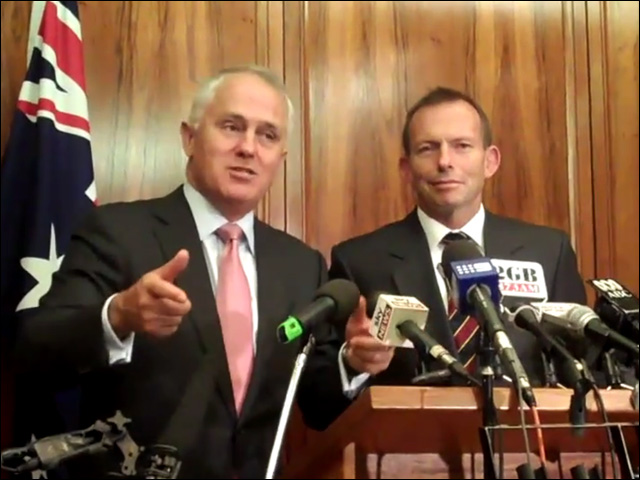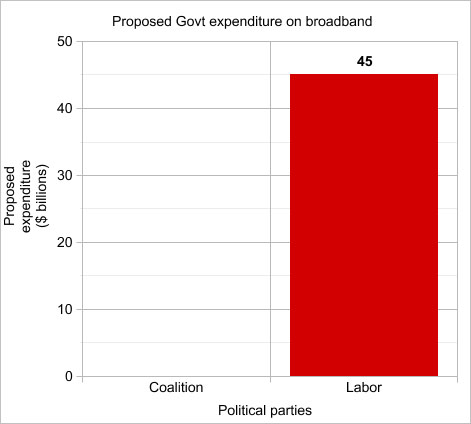fake news The Federal Opposition today released a comprehensive new broadband policy to rival Labor’s big-spending National Broadband Network project, describing its own initiative as a landmark ‘Fibre to the Nothing’ (FTTN) proposal.
Speaking at the National Press Club in Canberra today flanked by Opposition Leader Tony Abbott, Shadow Communications Minister Malcolm Turnbull told an audience of senior political figures and high-ranking executives from the telecommunications and technology industries that the new policy would be based on three key planks.
Firstly, he said, if it won government in the upcoming 2013 Federal Election, the Coalition would roll out fibre broadband infrastructure “nowhere”. “Nobody” in Australia would be provided with next-generation fibre broadband, Turnbull said, because there was “no demand” for the significantly faster speeds which it would provide compared with those available on the existing copper network, and “no-one” wanted to pay higher prices for faster broadband that would “not be used”.
Secondly, Turnbull said a Coalition Government would “never” deal with the issue of Telstra’s vertically integrated operations, which bitter rivals such as Optus, iiNet and Internode have long claimed prevented them from fairly competing in the broadband market, with Telstra being accused of playing favourites with its own retail division. There was “no need” to separate Telstra, according to the Member for Wentworth, as the telecommunications sector had “no shortage” of existing competition.
Lastly, Turnbull added that rural and regional areas around the country would receive “nil” in terms of total subsidies to allow them to purchase broadband services at comparable prices to metropolitan areas in Australia’s major cities. Citing expert commentary from leading economists, Turnbull said investing in this area would unnecessarily lead to “negative” outcomes for competition, distorting the industry in directions that would not serve consumer outcomes, he said.
“Nowhere, never, nil,” Turnbull told the audience emphatically at the conclusion of the speech. “It’s a comprehensive package — we’ve left nothing out.”
Speaking after Turnbull, Opposition Leader Tony Abbott praised the new ‘FTTN’ policy, saying the Coalition’s approach was sharply differentiated from the NBN strategy of the current Labor Federal Government, which he described as a “white elephant”. “The beauty of our policy,” he said, “is the amount of public money that we’ll be allocating to it: Nothing.”
The policy was immediately praised by the Economist Intelligence Unit, which had issued a report in October describing Labor’s NBN policy as the “most extreme” example of government intervention in high-speed broadband planning globally. At the time, Turnbull had used the Economist’s statement to brand the NBN policy as “the telecommunications version of Cuba”.
In a new statement this week, the EIU stated that the Coalition’s plan was the “most conservative” example of government intervention in a telco sector globally. “At the far end of this range of intervention — even further than Antarctica — is the Australian Coalition, which has pledged the lowest level of total public funds pledged, due to its plan to create, own and operate an ultra-fast fibre network in virtually no parts of the country,” the EIU said.
However, not everyone was enthusiastic about the Coalition’s new policy.
Optus chief executive Paul O’Sullivan said it wasn’t appropriate for the Government to do “nothing” about the dominance of Telstra over the telecommunications industry. “From its humble beginnings in 1992, Optus has grown to become a company which today supports more than nine million mobile services and one million fixed and broadband customers,” O’Sullivan said. “We’ve achieved all that through doing almost nothing.”
“But we could never have achieved that if the Federal Government had also done nothing,” the Optus chief added. “It’s important that the Government does something, or else the entire telecommunications industry won’t be able to do anything, and it should be obvious by now that nothing will come of that. For heaven’s sakes, the industry can’t just be left alone to do everything!”
However, in a separate interview following his speech, Turnbull rejected O’Sullivan’s comments. “[Communications Minister] Stephen Conroy gave the industry everything,” he said. “And look where it got him: Nowhere. Now we’re proposing something so simple that it can’t help but work: Nothing. Under our policy, we’ll nip this National Broadband Network policy in the bud, so that it never gets off the ground. The industry will have no place left to run to and no-one to bail it out.”
One final brief comment on the matter came from the maverick chief executive of Internet service provider Exetel, who has been consistently outspoken in his criticism of the NBN policy. Linton posted a brief blog post discussing the National Broadband Network policy this afternoon. “I always knew it would come to nought,” he said.
This article is satire … did we get you? ;)



I’m sorry Renai but this article is full of biased and your political alignment is clearly showing. I am never reading Delimiter again!
hehe now even the comments are turning satirical :)
★☆☆☆☆
Is it April Fool’s day? Got me a beauty. Saddest part is that the policy was so believable.
heh well the policy in this article is actually pretty close to their actual policy ;)
Close to their actual policy?
I was going to send some bodywash around to the Delimiter HQ, as clearly you’ve been dumpster diving at Malcolm’s place to get such a valuable reference to their plan!
How typical. When it comes to telecoms, Labor has already been delivering basically nothing for years. Trust Tony Abbott and Malcolm Turnbull to just steal Labor’s strategy and act like they are doing something new when they are offering exactly the same thing as Labor. The thing is, we have already come to expect nothing from Abbott and Turnbull, so does this mean they have actually fulfilled their promises? Smug bastards.
I so hope this article goes mainstream!
After 19 previous attempts, at last, a broadband plan that the Coalition will be able to deliver on!
Superb!
Disagree, doing nothing is far too much for them to handle.
*grin*
yes, anything short of renationalising the entire fixed-line communications sector is “doing nothing”.
love the satire.
This new policy should definitely be subjected to a rigorous and exhaustive cost-benefit analysis. Although, to their credit, at least this time the Coalition has released its detailed costings.
Renai
i think you have found your true calling.
I disagree with the use of the description “fake”
lol
Yes you got me, for a bit. About half way through I was wondering, “Is this a joke” But, it’s a scarily plausible policy for MrAbbot and co. to espouse.
Hehe that’s the thing I like about satire — it can be very close to real life :)
If you check time series “E10” which is “COMMONWEALTH GOVERNMENT SECURITIES ON ISSUE”, you will see that for the past three years we have been collectively borrowing over $40 billion per year, every year. So the big red bar up above with “Labor” writ underneath represents one year of commonwealth borrowing.
My vote will certainly not go towards more borrowing, but when the time comes that we all have to pay this back (and it will come), you all get to have a good think about why.
That big red bar that represents “one year of commonwealth borrowing” is:
1. Not the amount borrowed, but the total amount spent to build the infrastructure.
2. Not the total outlay of the government, since NBNco will start making money before the end of the build.
3. Is not spent in one year, but in 10 years.
There are good debts and there are bad debts. A debt to fund a world class infrastructure that improves
1. the equity (social meaning, not financial) of society,
2. the equity (financial meaning) of the country,
3. the efficiency of communications that impacts every single business operating in Australia.
4. the dividends paid to the government, directly benefiting the taxpayers.
What is not to like about this debt? Much better than spending the loan on non-income generating roads like the coalition is proposing to do.
LOL! Nice one Renai. So close to the truth its scary! :)
I wish they would start doing nothing now! The money and energy they are putting into opposing, blocking, hindering and delaying the NBN is astounding.
+1
If they had have put the same amount of energy into actually doing something about our broadband problems when they were in power, as they are now in opposing those who are doing something, we wouldn’t now be where we are!
This is a more detailed plan than their existing one.
I figured it was satire, but I admit it was when fletcher’s “comments” came in. So sad that I could believe it.
FTTN will not increase speeds inside your home because the Fibre Connection stops at the street. From the street to your house will not be a fibre connection. So nothing will change speed wise
Comments are closed.